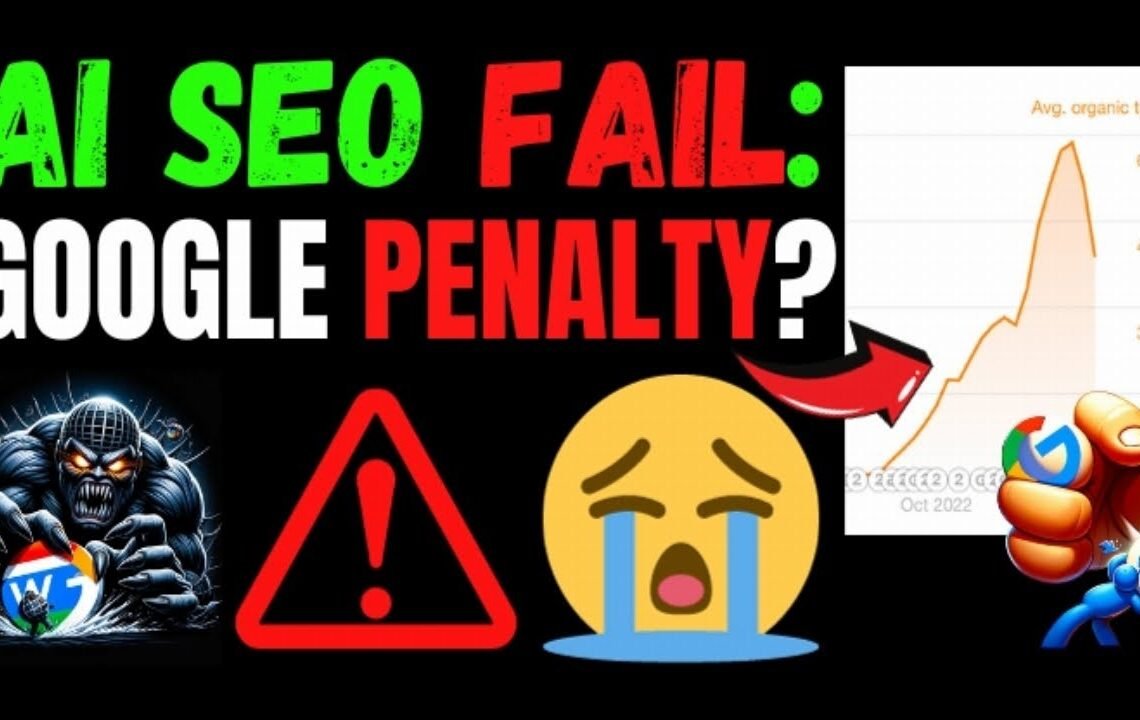😱AI SEO Case Study: Google PENALTY? 200K Traffic LOST (SEO Heist)😱

Have you experienced a sudden drop in website traffic despite your best SEO efforts? You may have been the victim of a Google penalty, which can be devastating for any online business. However, there is hope. In this AI SEO case study, we will explore a real-life scenario where a website saw a drastic drop in organic traffic due to a Google penalty. We will also discuss the steps taken to recover from the penalty and regain lost traffic using AI-powered SEO strategies. So, if you’ve been hit with a Google penalty and are struggling to regain lost traffic, keep reading to discover how AI can help you recover and thrive in the ever-evolving world of SEO.
Introduction
Today we’re going to be looking at one of the craziest and most controversial case studies in AI SEO and that is the SEO Heist from Jake Ward. Now if you haven’t seen this already, he got over 6 million views on Twitter recently and the case study itself is absolutely insane. Some people didn’t react so well to it, it was very controversial and polarizing, but that is one of the most interesting things about this case. Today we’re going to be talking about whether it’s good, bad, which website it affected, and whether Google actually slapped it because the site involved in this SEO heist apparent stole 3.6 million traffic from a competitor and has taken a big hit as well.
Case Study Details
This was a case study on the website cal.app. The traffic grew to a massive 586,000 per month, which is impressive. However, over the last year, the traffic has been falling dramatically. In October, the traffic hit a peak of 586,000, but in November, it dropped to 56,000 organic traffic, showing a trajectory that’s falling off a cliff.
The Process
The so-called SEO Heist worked in three simple steps – export a competitive sitemap, turn their list of URLs into article titles, and create 1,800 articles from those titles of the competitor at scale using AI. This process basically reverse engineers what’s working for the competitors, generates content based on that, and creates content at scale.
Ethics in AI SEO
This reverse engineering process is quite common in the SEO industry, where analyzing competitors’ strategies and creating content at scale is a known practice. However, it is essential to draw a line between ethical and unethical practices. While reverse engineering competitors’ strategies is a smart strategy to understand what Google likes, borrowing directly from competitors without any unique twist can lead to issues both ethically and in terms of search engine penalties.
Adapting in SEO
The SEO industry is constantly evolving, with new tools, technologies, and workflows being introduced regularly. It’s important to not get complacent and merely copy competitors’ strategies. Building one’s own system, understanding the philosophy of SEO, and implementing unique strategies is crucial for long-term success.
Conclusion
When it comes to reverse engineering competitors, it’s important to leverage their strategies for insight but not to outright copy them. While the process of reverse engineering in AI SEO is common, it is vital to always add a unique twist to the content and develop personal systems for adaptation and growth. It’s also crucial to understand the ethical implications of borrowing directly from competitors and the potential consequences it can have on search engine rankings.
AI SEO Case Study: Google PENALTY? 200K Traffic LOST (SEO Heist)
What is the AI SEO case study about?
The case study discusses the impact of a Google penalty on a website’s traffic, resulting in a loss of 200K visitors.
What led to the Google penalty?
The website engaged in unethical SEO practices, such as keyword stuffing, low-quality backlinks, and cloaking, which violated Google’s guidelines and led to the penalty.
What can be learned from this case study?
The case study serves as a warning about the consequences of black hat SEO techniques and the importance of following ethical SEO practices to maintain a website’s visibility in search engine results.
How can businesses avoid Google penalties?
Businesses can avoid Google penalties by focusing on providing high-quality, relevant content, building natural and authoritative backlinks, and adhering to Google’s Webmaster guidelines.
I hope you find useful my article 😱AI SEO Case Study: Google PENALTY? 200K Traffic LOST (SEO Heist)😱, I also recommend you to read my other posts in my blog.
If you need help with anything join the community or do not hesitate to contact me.
Please consider joining my newsletter or following me on social media if you like my content.


Leave a Reply